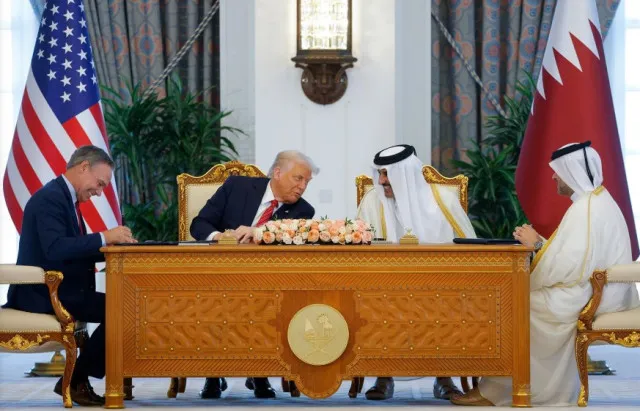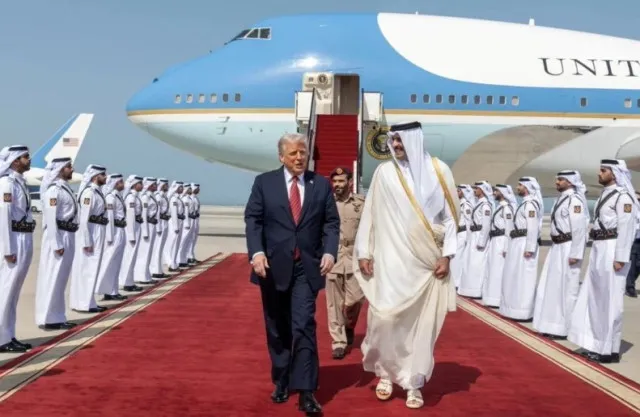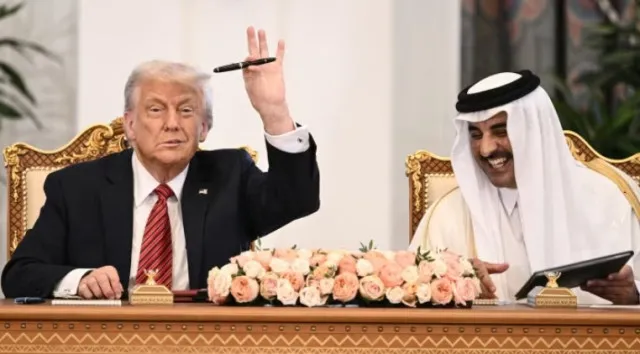Boeing has landed a record-breaking $96 billion deal with Qatar for 210 jets during President Trump’s high-profile Middle East visit.
In a major aviation milestone, Boeing has secured a groundbreaking deal with Qatar for up to 210 aircraft, valued at approximately $96 billion.
The White House calls it Boeing’s biggest widebody deal ever, providing a major boost for the U.S. aerospace company.
The agreement was announced during President Donald Trump’s visit to Doha as part of a broader economic partnership between the two nations.

Qatar Prime Minister addresses controversy over Air Force One Jet
Amid ongoing political debate, Qatar’s Prime Minister Sheikh Mohammed bin Abdulrahman bin Jassim Al-Thani addressed the controversy.
He emphasized that the deal to supply a Boeing 747-8, temporarily intended as Air Force One, is strictly a government-to-government transaction.
Qatar Prime Minister dismissed claims that the jet represented a personal gift to Trump, reinforcing the formal diplomatic nature of the agreement.
Trump plans to donate the jet to his library, but lawmakers from both parties worry it may signal inappropriate foreign influence.
Boeing wins record-breaking $96B aircraft deal with Qatar during Trump’s Middle East trip
During Trump’s visit to Doha, the U.S. and Qatar announced over $243 billion in economic deals, strengthening bilateral trade and investment ties.

The centerpiece is the historic Boeing deal involving 130 787 Dreamliners and 30 larger 777-9 jets, with options for an additional 50 aircraft across both models.
The Dreamliner is Boeing’s widebody twin-engine aircraft known for its fuel efficiency and passenger comfort.
The 777-9 is a newer, larger variant designed to compete with other widebody jets.
Stephanie Pope, Boeing Commercial Airplanes CEO, thanked Qatar for the order, calling it a strong endorsement of Boeing’s widebody aircraft lineup.
“We are deeply honored that Qatar Airways has placed this record-breaking order with Boeing, one that solidifies their future fleet with our market-leading widebody airplane family at its center.”
Boeing faces challenges amid industry struggles
While the order represents a positive outlook, Boeing is still recovering from a challenging period.
The company’s orders suffered a steep decline last year, dropping by 60% compared to 2023.

This slump followed a high-profile incident where an Alaska Airlines 737 Max lost a door plug mid-flight, casting doubts on Boeing’s safety and reliability.
Additionally, a strike involving 33,000 machinists disrupted production in the fall, delaying deliveries and impacting Boeing’s output for the year.
Trump’s imposition of tariffs, dubbed “Liberation Day” tariffs, also adds to Boeing’s financial pressure.
Trade restrictions raise costs of globally sourced aircraft parts, potentially increasing jet prices by millions each.
The administration appears to be leveraging Boeing’s order pipeline as part of a broader trade negotiation strategy.

U.S. secures additional aviation and defense deals in Qatar
Beyond the aircraft purchase, the Trump delegation finalized several other agreements in Qatar.
Defense Secretary Pete Hegseth signed several defense cooperation agreements.
These included acceptance letters for MQ-9B drones and small aerial systems countering unmanned threats.

These moves signal a deepening military partnership between the two nations.
Last week, Commerce Secretary Howard Lutnick announced $10 billion Boeing deal with British airline IAG for 30 787 jets.
These deals underline the administration’s focus on revitalizing the aerospace sector through robust export sales.
Trump’s Middle East tour bolsters US influence and economy
President Trump’s Qatar visit follows Saudi Arabia’s announcement of $600 billion in technology and defense contracts the previous day.
The trip will conclude in the United Arab Emirates, completing the first overseas tour of Trump’s second term.
This diplomatic journey underscores the administration’s effort to strengthen strategic ties and boost American exports in key global markets.